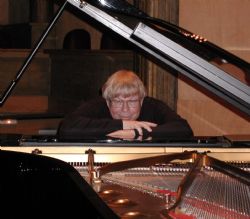|
Symphony
MONUMENTAL MAHLER 5TH IN SO CO PHIL'S SEASON ENDING CONCERT
by Terry McNeill
Sunday, April 14, 2024
Chamber
OAKMONT SEASON CLOSES WITH STRAUSS' PASSIONATE SONATA
by Terry McNeill
Thursday, April 11, 2024
Chamber
MORE GOLD THAN KORN AT ALEXANDER SQ CONCERT
by Terry McNeill
Sunday, April 7, 2024
Choral and Vocal
VIBRANT GOOD FRIDAY REQUIEM AT CHURCH OF THE ROSES
by Pamela Hicks Gailey
Friday, March 29, 2024
TWO OLD, TWO NEW AT THE SR SYMPHONY'S MARCH CONCERT IN WEILL
by Peter Lert
Saturday, March 23, 2024
Chamber
NOT A SEVENTH BUT A FIRST AT SPRING LAKE VILLAGE CONCERT
by Terry McNeill
Wednesday, March 20, 2024
THIRTY-THREE PLUS VARIATIONS AND AN OCEAN VIEW
by Terry McNeill
Saturday, March 16, 2024
Choral and Vocal
A ST. JOHN PASSION FOR THE AGES
by Abby Wasserman
Friday, March 8, 2024
Choral and Vocal
SPLENDID SCHUBERT SONGS IN SANET ALLEN RECITAL
by Terry McNeill
Saturday, March 2, 2024
Chamber
SHAW'S MICROFICTIONS HIGHLIGHTS MIRO QUARTET'S SEBASTOPOL CONCERT
by Peter Lert
Friday, March 1, 2024
|
 |
 Pianist Kenn Gartner |
GARTNER PLAYS FAMILIAR CHOPIN IN APRIL 22 RECITAL AT MARIN'S J-B PIANO
by John Metz
Sunday, April 22, 2012
Marin pianist Kenn Gartner performed a recital April 22 at San Rafaelís J-B Piano. The all-Chopin program was not particularly adventurous but easily accessible for audiences and a safe bet for getting the more reluctant concertgoers to attend.
Mr. Gartnerís Chopin playing is refreshing because of the freedom, nonchalance, and rawness with which he plays familiar repertoire. In this 21st Century world of cookie-cutter super virtuosos, a pianist who has the guts to go onstage and just be himself is rare.
The program began with one of Chopinís most famous melodies, familiar to even to those with limited knowledge of classical piano repertoire: the E-flat major Nocturne from Opus 9. Gartner took an unusually slow tempo to start, but soon abandoned it, adopting several other tempi throughout the piece. He utilized a vast palette of tonal colors, and there were some magical moments where the performer drew the listener in with surprising pianissimos and striking rubato. Though in general, the tone for this piece was muscular and the rhythm seemed amorphous.
One of the afternoonís highlights was the epic G minor Ballade. As was true of the Nocturne, tempi in this work shifted dramatically throughout, which reduced the overall cohesiveness of the Ballade, and made what otherwise would be a united whole into more choppy vignettes of this, that, and the other. Mr. Gartnerís strength in the Ballade was his willingness to let go and pull out all the stops for the climaxes. And he gave new life to lines in the music that many performers often neglect. Yet there was often a sense of too much trying. Too much muscle in the tone, overplaying the rubato and wrong or missing notes.
The Two Nocturnes of Op. 27 are among Chopinís best works in the genre. The first of the two, the Nocturne in C-Sharp Minor, has serene and introspective outer sections pitted against a dramatic whirlwind in the middle. And the second, in D-flat major is, or should be, nothing short of spiritual. I wanted to hear more tonal beauty in these performances, though I appreciated the pianist's careful attention to the often hidden musical lines of the D flat. And in the famous Military Polonaise of Op. 40, I missed the excitement of the polonaise rhythm. Mr. Gartner brought out the drama of the Op. 40 Polonaise in C minor, highlighting the abrupt and enormous dynamic contrasts within an overall melancholy quality. And he played the lovely G-flat major Impromptu, Op. 51, with great speed. Yet I wanted the pianist to charm the audience even more with this wonderfully wistful piece.
The recital closed with Chopinís famous Heroic Polonaise in A-flat major, Op. 53. In this work the technical centerpiece is the rousing moto perpetuo bass octaves in the middle section. Mr. Gartner executed these with great facility and I appreciated that the octaves had shape and started quiet, growing louder only as the right hand melody grew, keeping the listener in suspense as he approached the more dramatic climaxes. As with most the afternoonís playing, accuracy was lacking, and the tone seemed harsh. But then again, the Heroic Polonaise is a rather loud piece.
For an encore, there was the famous D-Flat Major Waltz from Op. 62, "Minute."
|
